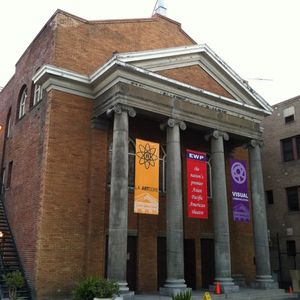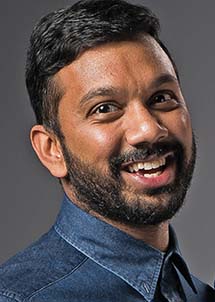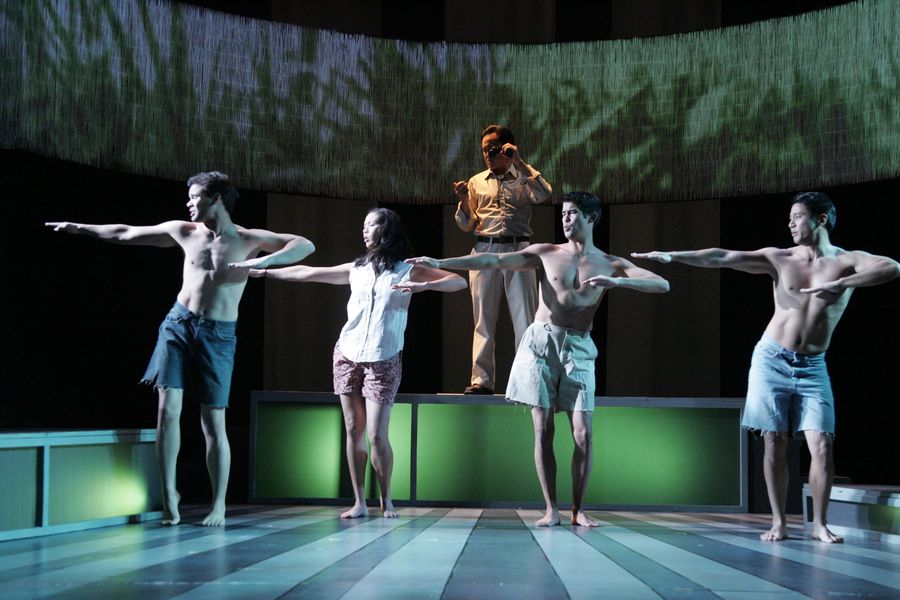In 2018, Sandra Oh made history as the first woman of Asian descent to be Emmy-nominated for lead actress in a drama series. The Killing Eve actor also went viral for her perfectly delivered response to the nomination during the awards ceremony, a twist on a familiar awards show cliché: “It’s an honor just to be Asian.”
The phrase was immortalized on a black T-shirt, the sales of which served as a fundraiser for East West Players, the nation’s longest-running Asian American theatre, with a budget of close to $1.5 million. The journey of that T-shirt campaign—organized by East West Players board member Jeff Yang—has been a source of pride, said EWP producing artistic director Snehal Desai.
Based in Los Angeles, East West Players was founded in 1965 as a place where Asian American actors could expand beyond the stereotypical roles they were limited to in Hollywood. Since then, the theatre has premiered more than 200 plays and musicals about the Asian American experience, and attracts an audience that is over 70 percent people of color.
The theatre’s longtime mission to increase the visibility of the Asian American experience took on a renewed relevance in 2021, after eight people, including six women of Asian descent, were killed by a shooter targeting Atlanta-area spas in 2021. The “honor just to be Asian” shirts became a symbol of defiance against bigotry and hate, and East West Players became a leader in organizing events and PSAs responding to the alarming rise in anti-Asian violence across the U.S. People reached out wanting to buy more of the T-shirts, so the theatre relaunched a special edition of that campaign, ultimately raising more than $20,000 for Stop AAPI Hate, a fund supporting victims and families of the spa shootings, as well as for East West Players programs focused on combating anti-Asian rhetoric and violence. More recently, T-shirt sales celebrated Asian Pacific American Heritage Month (May).
“They’ve taken on a new kind of urgency,” Desai said of the T-shirt campaign. “It tells you how the moment has changed, because now sometimes folks think a second time before wearing them out. It’s us having to gain that strength and that confidence, and for EWP to have that shirt showing how proud we are to display that. To confront this fear in this moment to me is really important.”
This is just one example of how East West Players listens and responds to the needs of the community—a responsiveness, Desai believes, that accounts for the theatre’s staying power over more than 50 years. To give just one example: In the early days of the COVID-19 pandemic, East West Players embraced the shift to digital shows and educational programming for emerging artists, allowing the theatre to attract a national audience. “There’s only one East West Players, but there are Asian Americans in every pocket of this country, and they’re not all able to take classes at an Asian American theatre with Asian American artists, or instructors of color necessarily, where they are,” Desai said.

In 2021, the theatre partnered with API-Rise, a nonprofit working with Asian, Native Hawaiian, and Pacific Islander Americans who have been impacted by the criminal justice system for an online production, From Number to Name. Directed by Kristina Wong, an artist and elected representative of L.A.’s Koreatown (and a Pulitzer finalist for the show Kristina Wong, Sweatshop Overlord), the show featured stories about incarceration and restorative justice.
“We’re constantly assessing who is marginalized, whose story hasn’t been told, who haven’t we seen on our stage, and what can we do to bring them front and center,” said Desai. “We just understand that the work is never done.”
The theatre’s simultaneous dedication to social justice and to the highest level of artistry is similar to the work of other organizations serving communities of color. As such, East West Players was included in a survey by researchers at SMU’s DataArts seeking to understand the successful strategies used by high-performing arts organizations of color to stay relevant and resilient. Released in 2021 in partnership with the Wallace Foundation, the report, “The Alchemy of High-Performing Arts Organizations, Part II: A Spotlight on Organizations of Color,” featured input from 21 leaders at groups, including Apollo Theater, Dallas Black Dance Theatre, and Theater Mu.
One major takeaway was the importance of the intersection between community-oriented and high-quality programming.
“When East West Players started, there was no one else doing what we’re doing, and even now, locally and nationally, there are very few places,” Desai says. “So we have a very clear niche and defined audience.”
While some arts institutions have only begun to scratch the surface when it comes to diversity efforts, the values of diversity, equity, and inclusion are embedded in the essence of East West Players.
“We try to break apart the Asian American monolith and explore the diaspora in more detail, and let folks know that the Korean American experience is different than the Japanese American experience,” Desai said. “We all have our different histories and stories, and you can’t just plug us into one giant umbrella.”
Remarkably, more than two years into the pandemic, East West Players is emerging stronger than before. While for years, the theatre had been treading water financially, “just trying to make it payroll to payroll, or month to month, or show to show,” as Desai put it, the pandemic pause, combined with changes in the funding landscape, have combined to put EWP in a strong position.

This is in contrast to historic trends. Like other organizations, especially theatres of color, East West Players often encountered a glass ceiling when it came to funding. A key observation from the SMU DataArts report is that inequitable access to funding often inhibits organizations of color from achieving their goals, and funding for artistic creation is often based on budget size. “No theatre of color has a budget over $3 million,” one theatre leader in the survey pointed out. “Until we reach $5 million, we don’t get access to commission funding or new-work development support.”
But Desai noted that philanthropic institutions are now providing more funding for general operating support, allowing organizations to keep staff employed and pay rent. And in L.A., funders are beginning to consider changing funding structures so that smaller organizations can receive larger gifts. Major grants, including $2 million from the Ford Foundation (announced in 2020) and a multi-million dollar gift from philanthropist MacKenzie Scott (announced in 2021), have allowed East West Players to stabilize operations, pay down all debt, forward plan, and even save for the future. “All those have been transformative and game changing,” said Desai. “I suddenly see funders who didn’t fund us or even give us any attention are now reaching out to support us.”
Arts groups of color are also empowering each other by working together. Each week, Desai meets with a group of BIPOC artistic directors in L.A. “We are coming together to go collectively to funders,” he noted. “In Minneapolis and in other cities, they’ve done that really successfully.”
With the resources to strategize for the future, Desai said that increased accessibility, including embracing digital performances, are important next steps to reach new audiences. He also hopes to be able to take more artistic risks, and to embark on projects “I didn’t feel we could do when we were on such a shoestring budget.”
The pandemic highlighted the sometimes transactional, even exploitive relationship between theatres and artists. Desai said he is happy to see theatre shift to a more equitable distribution of pay and resources. “As organizations, we need to look at how we can center our artists and support them beyond a show or a piece of work, but support a career in theatre.”
Importantly, Desai said he plans to pay it forward with support for other arts institutions. “I know exactly where they are and what they’re dealing with,” he said. “It’s very tenuous. I know how it feels right now in the moment, and we’re in a good place, so I can only imagine what it’s like for them. We want to see everyone come back from this.”
Makeda Easter is an independent journalist who is currently building a platform focused on artist-activists called the art rebellion.
Creative credits for production photo: “Three-Year Swim Club,” written by Lee Tonouchi, directed and choreographed by Keo Woolford, with scenic and projection design by Adam Flemming, sound design by Dennis Yen, lighting design by Chris Kuhl, props by Ken Takemoto, costume design by Ken Takemoto, and stage management by Maya Rogers.


